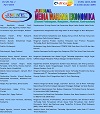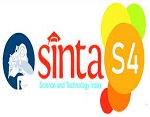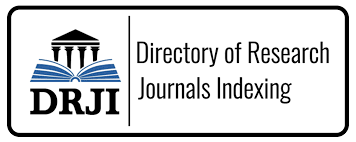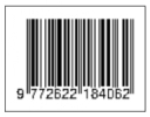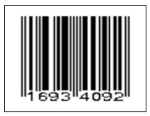Perbedaan Uang Saku Mahasiswa STEBIS IGM Pada Saat Covid 19 dan New Normal
DOI:
https://doi.org/10.31851/jmwe.v20i1.11510Abstract
ABSTRAK
Pada saat Pandemi Covid 19 sistem pembelajaran di STEBIS IGM dilakukan secara online. Hal ini memberikan keuntungan bagi para orang tua karena mereka tidak perlu menyiapkan uang lebih untuk membiayai transport dan jajan ketika berada dikampus. Para orang tua hanya perlu memberikan uang membeli kuota internet. Penelitian ini bertujuan untuk mengetahui adakah perbedaan uang saku yang diberikan oleh mahasiswa STEBIS IGM pada saat pandemi dan new Normal. Metode penelitian yang digunakan adalah metode paired t-tes. Adapun sample yang digunakan sebanyak 55 mahasiswa STEBIS IGM. Proses pengambilan sampel dilakukan dengan metode simple ramdom sampling. Hasil penelitian menunjukkan nilai signifikansi 0,00 yang berarti terdapat perbedaan uang saku yang diterima mahasiswa STEBIS IGM pada saat pandemi Covid 19 dan New Normal. Jumlah uang yang diterima saat Covid lebih sedikit dari pada saat New Normal.
Kata Kunci: Uang Saku, Covid 19, New Normal
ABSTRACT
During the Covid 19 Pandemic the learning system at STEBIS IGM was carried out online. This provides an advantage for parents because they do not need to prepare extra money to pay for transportation and snacks while on campus. Parents only need to give money to buy internet quota. This study aims to find out whether there is a difference in the pocket money given by STEBIS IGM students during the pandemic and the new normal. The research method used is paired t-test method. The sample used was 55 STEBIS IGM students. The sampling process was carried out by simple random sampling method. The results of the study showed a significance value of 0.00, which meant that there was a difference in the pocket money received by STEBIS IGM students during the Covid 19 pandemic and New Normal. The amount of money received during Covid was less than during New Normal.
Keywords: Pocket Money, Covid 19, New Normal
References
Ahlstrom, D., Arregle, J., & Hitt, M. A. (2020). Managing Technological , Sociopolitical , and Institutional Change in the New Normal. Jounrnal Management Studies, May. https://doi.org/10.1111/joms.12569
Aravik, F. and H. (2022). Comparison of The Income of The Stebis Igm Academic Community During The Covid-19 And New Normal Pandemic Comparison of The Income of The Stebis Igm Academic. Al-Masharif: Jurnal Ilmu Ekonomi Dan Keislaman, 10, 83–95.
Azimah, R. N., Khasanah, I. N., Pratama, R., Azizah, Z., Febriantoro, W., & Purnomo, S. R. S. (2020). Analisis Dampak Covid-19 Terhadap Sosial Ekonomi Pedagang Di Pasar Klaten Dan Wonogiri. EMPATI: Jurnal Ilmu Kesejahteraan Sosial, 9(1), 59–68. https://doi.org/10.15408/empati.v9i1.16485
Azummy, W. T. D. M. R. (2020). Hubungan Covid 19 Terhadap Sektor Pendidikan, Ekonomi Dan Pertanian (Ekologi) Di Indonesia Wirman. 1(5), 613–628.
Carroll, N., & Conboy, K. (2020). Normalising the “new normal”: Changing tech-driven work practices under pandemic time pressure. International Journal of Information Management, 55(July), 102186. https://doi.org/10.1016/j.ijinfomgt.2020.102186
Chairani, I. (2020). Dampak Pandemi Covid-19 Dalam Perspektif Gender Di Indonesia. Jurnal Kependudukan Indonesia, 2902, 39. https://doi.org/10.14203/jki.v0i0.571
Istiatin, Sudarwati, Burhanudin, Beno, Fera, Indah, I. (2021). Meningkatkan Perilaku Mawas Diri Pada Era New Normal Masyarakat Jurangjero, Karangmalang, Sragen. Jurnal Budimas, 03(01), 1–6. jurnal Budimas Vol. 3 No, 1
Kaushik, N., & Arora, P. (2020). Performance Appraisal in the Era of New Normal. J. Technol. Manag. Grow. Econ, 11(1), 11–15.
Pham, H. H., & Ho, T. T. H. (2020). Toward a ‘new normal’ with e-learning in Vietnamese higher education during the post COVID-19 pandemic. Higher Education Research and Development, 39(7), 1327–1331. https://doi.org/10.1080/07294360.2020.1823945
Puspita Sari, M., & Fadilla. (2021). Dampak Covid 19 Terhadap Sistem Pembelajaran Dan Keuangan Di Stebis Igm. Islamic Banking: Jurnal Pemikiran Dan Pengembangan Perbankan Syariah, 7(1), 94–114. https://doi.org/10.36908/isbank
Rusiadi, Aprilia, A., Adianri, V., & Verawati. (2020). Dampak Covid-19 Terhadap Stabilitas Ekonomi Dunia (Studi 14 Negara Berdampak Paling Parah). Jurnal Kajian Ekonomi Dan Kebijakan Publik, 5(2), 173–182.
Seshadri, D. R., Thom, M. L., Harlow, E. R., & Drummond, C. K. (2021). Case Report : Return to Sport Following the COVID-19 Lockdown and Its Impact on Injury Rates in the German Soccer League. Case Report, 3(February), 1–7. https://doi.org/10.3389/fspor.2021.604226
Sina, P. G. (2020). Ekonomi Rumah Tangga Di Era Pandemi Covid-19. Journal of Management : Small and Medium Enterprises (SMEs), 12(2), 239–254. https://doi.org/10.35508/jom.v12i2.2697
Susilo, A., Martin Rumende, C., Pitoyo, C. W., Djoko Santoso, W., Yulianti, M., Sinto, R., Singh, G., Nainggolan, L., Nelwan, E. J., Khie Chen, L., Widhani, A., Wijaya, E., Wicaksana, B., Maksum, M., Annisa, F., Jasirwan, C. O., & Yunihastuti, E. (2020). TINJAUAN PUSTAKA. In Jurnal Penyakit Dalam Indonesia | (Vol. 7, Issue 1). https://www.ncbi.nlm.nih.gov/nuccore/
Tanjung, H. (2022). Creativity and Innovation in Small Business : A Digital System Literature Review with Round Map New Normal. Proceeding International Seminar on Islamic Studies Medan, February 23th-24th, 2022 Volume, 3, 795–802.
Winarso, S., Kukuh, P., Dhanny, P., Elia, Y., Ogis, P., & Rizqi, A. (2020). Penerapan Protokol Kesehatan COVID-19 di Era New Normal Pada Kampung Tangguh Desa Karangdoro, Terminal Jajag, dan RTH Maron Genteng, Kabupaten Banyuwangi. Multidisciplinary Journal, 3(1), 25. https://doi.org/10.19184/multijournal.v3i1.23684
Wuryandani, D. (2020). Dampak Pandemi COVID-19 Terhadap Pertumbuhan Ekonomi Indonesia 2020 dan Solusinya. Info Singkat Bidang Ekonomi Dan Kebijakan Publik Pusat Penelitian Badan Keahlian DPR RI, 12(15), 19–24.
Downloads
Published
Issue
Section
License
Copyright (c) 2023 Jurnal Media Wahana Ekonomika

This work is licensed under a Creative Commons Attribution-NonCommercial 4.0 International License.
The copyright of the received article shall be assigned to the publisher of the journal licensed under a Creative Commons Attribution-NonCommercial 4.0 International License in line with the license, authors and any users (readers and other researchers) are allowed to share and adapt the material only for non-commercial purposes. In addition, the material must be given appropriate credit, provided with a link to the license, and indicated if changes were made. If authors remix, transform or build upon the material, authors must distribute their contributions under the same license as the original.

